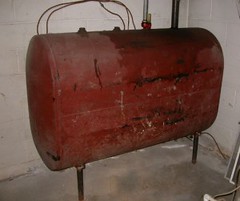Yes, Oil tanks are becoming a problem in the sale of Real Estate. Underground oil tanks are out and out impossible. Walk away.
Aboveground Oil tanks are the norm, and simply put, Insurance companies do not like them. If you read the article you will see why. The problem I have, is that most home owners with oil tanks are not aware of the "new regulations".
Here is the section that applies:
It is a legislative requirement prescribed by Ontario Regulation 213/01, "Fuel Oil". Section 7 of the Regulation states:
|
Additional Information:
- This is a mandatory inspection and therefore you must not refuse the inspection service being arranged by a fuel oil distributor.
- Inspection service refusal will prevent fuel oil delivery.
- A person who is the holder of a certificate for that purpose shall carry out the inspection. I.e. An oil burner technician (OBT).
- The certified oil burner technician (OBT) may not necessarily work for the fuel oil distributor but may be an agent or sub-contractor of the Fuel Oil distributor.
- You may contact a fuel oil distributor who is different from the one you currently deal with if you are not satisfied with the service being provided.
- Each distributor is responsible for the inspection performed on their client's heating systems. When you switch to a new distributor you may be required to undergo a new inspection. If you change distributors and the new distributor agrees with the previous inspection report, a new inspection may not be necessary. Check with the new distributor to see if they would accept the previous inspection report.
- Both TSSA and fuel oil industry representatives have developed specific checklists that outline minimum inspection requirements.
- There are also inspection requirements for propane systems and natural gas systems.
- See also Comprehensive inspections - Cost considerations and Comprehensive inspections - Disagreeing with results.
Imagine the home owners surprise when they sell their home with an Oil Tank, for which they have been receiving oil, and the Buyer/Home Inspector/Realtor informs them that their tank "might not" be up to code and we need a TSSA certificate. Imagine their further surprise when they find out the tank and lines do not pass, and they need to be replaced at a cost of approx $1,000. They are now upset with the Buyer/Home Inspector/Realtor, for something that this legislation clearly says is the fuel oil distributors responsibility.
Didn't we see the TSSA's name mentioned in the Propane explosion in Toronto? Are they maybe passing more laws than they are capable of enforcing?
Here is a link to Bob Aaron's article in the Star. The hole in the tank was the size of the tip of a pen...
http://www.yourhome.ca/homes/article/497042




